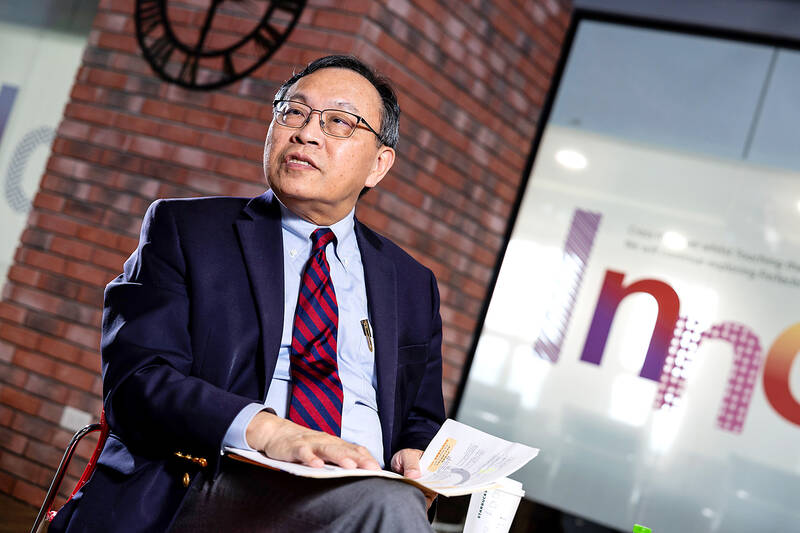The ratio of the Bank of Taiwan’s exposure to China over its net worth has fallen sharply to 3.42 percent as the bank seeks to reduce its reliance on the Chinese market, it said.
Bank of Taiwan chairman Joseph Lyu (呂桔誠), who has led Taiwan’s largest lender since 2016, said in a recent media interview that the ratio had plunged from a peak of about 45 percent eight years earlier.
That drop occurred as many Taiwanese investors diversified away from China to lower risks amid escalating trade tensions and technology competition between Washington and Beijing, Lyu said.

Photo: CNA.
Bank of Taiwan’s figure echoed data released by the Financial Supervisory Commission (FSC) earlier this month, which showed that Taiwanese banks’ exposure to China regarding their net worth as a whole for the first quarter of this year fell NT$8.14 billion (US$252.75 million), or 0.85 percent, from a quarter earlier to NT$952.86 billion.
However, the local banking sector as a whole still had a relatively high ratio of exposure to China, even though it fell 0.6 percentage points from a quarter earlier to 22.1 percent in the first quarter of this year, the FSC data showed.
The sector’s total exposure to China and the ratio have fallen to new lows since the commission started the tallies in the third quarter of 2013, the commission said, citing concerns over China’s economy and risks in the Chinese property market as a cause.
As for the fall in the Bank of Taiwan’s exposure to China, which has pushed down its profits generated from China, including Hong Kong, Lyu said the bank has been keen to seek a balance in corporate banking, consumer banking and services to the public sector to make up for a possible fall in profit.
Once profits from its corporate banking operations drops, the bank would be able to turn its attention to consumer banking services, he said.
Lyu said he is upbeat about Taiwan’s economic growth for this year, although uncertainty over when the US Federal Reserve would cut interest rates, sticky inflation and geopolitical unease are expected to affect the pace of the recovery.
Taiwan would fare better economically this year as artificial intelligence development has created tremendous business opportunities for the local sector, but old economy industries still face challenges, he said.
At the same time, the Bank of Taiwan is seeking to extend its global reach by setting up outlets overseas, he said, adding that it opened a representative office in Arizona in 2022.
That office would help contract chipmaker Taiwan Semiconductor Manufacturing Co (台積電), which is building advanced wafer fabs in the US state, as well as the chipmaker’s suppliers, Lyu said.

The Central Election Commission has amended election and recall regulations to require elected office candidates to provide proof that they have no Chinese citizenship, a Cabinet report said. The commission on Oct. 29 last year revised the Measures for the Permission of Family-based Residence, Long-term Residence and Settlement of People from the Mainland Area in the Taiwan Area (大陸地區人民在台灣地區依親居留長期居留或定居許可辦法), the Executive Yuan said in a report it submitted to the legislature for review. The revision requires Chinese citizens applying for permanent residency to submit notarial documents showing that they have lost their Chinese household record and have renounced — or have never

A magnitude 5.6 earthquake struck off the coast of Yilan County at 12:37pm today, with clear shaking felt across much of northern Taiwan. There were no immediate reports of damage. The epicenter of the quake was 16.9km east-southeast of Yilan County Hall offshore at a depth of 66.8km, Central Weather Administration (CWA) data showed. The maximum intensity registered at a 4 in Yilan County’s Nanao Township (南澳) on Taiwan’s seven-tier scale. Other parts of Yilan, as well as certain areas of Hualien County, Taipei, New Taipei City, Taoyuan, Hsinchu County, Taichung and Miaoli County, recorded intensities of 3. Residents of Yilan County and Taipei received

Taiwan has secured another breakthrough in fruit exports, with jujubes, dragon fruit and lychees approved for shipment to the EU, the Ministry of Agriculture said yesterday. The Animal and Plant Health Inspection Agency on Thursday received formal notification of the approval from the EU, the ministry said, adding that the decision was expected to expand Taiwanese fruit producers’ access to high-end European markets. Taiwan exported 126 tonnes of lychees last year, valued at US$1.48 million, with Japan accounting for 102 tonnes. Other export destinations included New Zealand, Hong Kong, the US and Australia, ministry data showed. Jujube exports totaled 103 tonnes, valued at

BIG SPENDERS: Foreign investors bought the most Taiwan equities since 2005, signaling confidence that an AI boom would continue to benefit chipmakers Taiwan Semiconductor Manufacturing Co’s (TSMC, 台積電) market capitalization swelled to US$2 trillion for the first time following a 4.25 percent rally in its American depositary receipts (ADR) overnight, putting the world’s biggest contract chipmaker sixth on the list of the world’s biggest companies by market capitalization, just behind Amazon.com Inc. The site CompaniesMarketcap.com ranked TSMC ahead of Saudi Aramco and Meta Platforms Inc. The Taiwanese company’s ADRs on Tuesday surged to US$385.75 on the New York Stock Exchange, as strong demand for artificial intelligence (AI) applications led to chip supply constraints and boost revenue growth to record-breaking levels. Each TSMC ADR represents